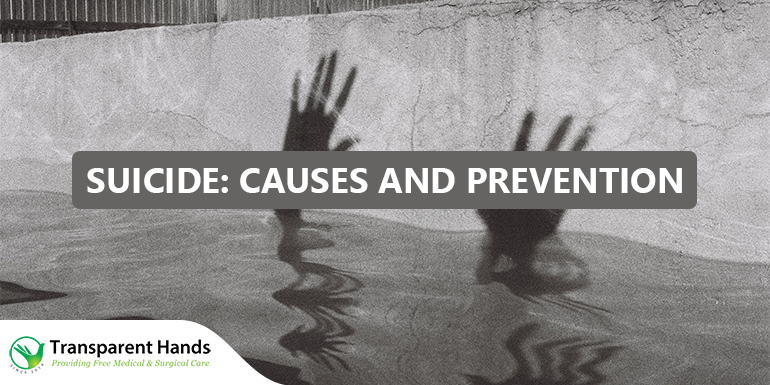Suicide: Causes and Prevention

Suicide is a serious and complex issue that affects individuals and communities worldwide. It’s essential to comprehend the factors leading to suicide, understand prevention strategies, and learn how to overcome the underlying causes such as depression.
Suicide Causes
Mental Health Challenges: Mental health disorders, particularly depression, anxiety, bipolar disorder, and schizophrenia, contribute significantly to suicide risk.
Social Isolation: Feelings of loneliness and isolation can intensify suicidal thoughts, as humans thrive on social connections.
Life Events: Experiencing traumatic life events like loss of a loved one, relationship breakdowns, financial hardships, or legal troubles can trigger feelings of hopelessness.
Substance Abuse: Drug and alcohol misuse can impair judgment and exacerbate emotional distress, increasing suicide risk.
History of Trauma: People who have experienced childhood abuse, neglect, or other traumatic events may struggle with long-lasting emotional pain.
Suicide Prevention
Promoting Mental Health Awareness: Education about mental health can help destigmatize seeking help and encourage open conversations.
Access to Support: Creating a supportive environment where individuals feel comfortable discussing their feelings can be crucial.
Professional Help: Therapists, counselors, and psychiatrists offer specialized care to address mental health challenges.
Crisis Helplines: Many countries have helplines that provide immediate support to individuals in crisis.
Community Involvement: Engaging in activities and connecting with others can provide a sense of belonging and purpose.
Responsible Media Reporting: Media should avoid sensationalizing suicide and instead focus on prevention and resources.
Overcoming Depression
Recognize the Signs: Understand the symptoms of depression, such as persistent sadness, loss of interest, changes in appetite or sleep patterns, and low energy.
Seek Professional Help: Reach out to mental health professionals who can provide therapy, counseling, or medication.
Healthy Lifestyle: Regular exercise, a balanced diet, and sufficient sleep can positively impact mood.
Social Support: Surround yourself with caring friends and family who can offer emotional support.
Set Realistic Goals: Break tasks into manageable steps to prevent feeling overwhelmed.
Mindfulness and Relaxation: Techniques like deep breathing, meditation, and mindfulness can help manage stress.
Avoid Self-Isolation: Engage in activities you enjoy and connect with others to combat feelings of loneliness.
Conclusion
Understanding the underlying causes of suicide and recognizing the importance of prevention is crucial for individuals, families, and communities. By promoting mental health awareness, seeking professional help, and adopting healthy coping strategies, we can work together to prevent suicide and provide the necessary support to those who need it. Remember, there is help available, and no one has to face these challenges alone.










Leave Your Comments